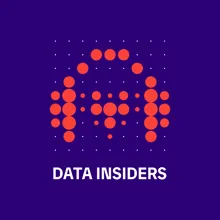
Data and AI for sustainable growth: Aker BP’s journey
What does the future of energy look like? How can data-driven innovations help us hit sustainability goals?
What does the future of energy look like? How can data-driven innovations help us hit sustainability goals? In our Data Insiders podcast, we approach these questions with Aker BP’s Paula Doyle and Dennis Peter from Tietoevry Tech Services.
All heavy industries are in the middle of an unprecedented transformation. As environmental concerns challenge us to reconsider our relationship with energy and carbon footprint, the sector needs new forward-thinking approaches. Artificial intelligence shows immense promise – but most organizations in the field are known to tread carefully when it comes to new technologies.
In recent years, oil and gas company Aker BP has made waves by challenging this status quo. Harnessing data-driven approaches, they have managed to significantly reduce CO2 emissions while keeping the prices low. And with projects such as the upcoming Yggdrasil – the most advanced oil and gas development in Norway – their success offers an exciting peak into where the sector is headed in the future.
For the latest episode of our Data Insiders podcast, we invited Aker BP’s Chief Digital Officer Paula Doyle to share her insights on how the bold use of data was built into the DNA of the company. Joining her in studio was Dennis Peter, the Head of Industry and Commercial at Tietoevry Tech Services in Norway. Enthusiastic about the possibilities that lie ahead, he has aided many major companies in the industrial sphere excel in digital innovation.
The conversation covered topics such as sustainability, Aker BP’s technical breakthroughs and how we can build company cultures that are better equipped to thrive in the face of the current global challenges.
Embracing the paradigm shift
Aker BP’s journey from an underdog into one of biggest independent oil and gas companies in Europe in under a decade, producing the oil and gas with world leading low carbon intensities per barrel, is nothing short of remarkable. This success is also tied to the advanced ways they utilize data – but what does it mean in practice?
Doyle starts by highlighting one major example: some of Aker BP’s assets use gas turbines to generate power. With clever algorithms, Aker BP has managed to significantly optimize their use by reducing unnecessary running time. The accumulated increase in productivity is significant, as is the lowered carbon footprint. The same principle applies throughout Aker BP’s entire value chain.
The reliability of the technology has exceeded all Aker BP’s expectations, resulting in even less manual labor, lower costs and reduced strain on the environment.
For Peter, this illustrates what he sees as the most crucial part of digitalization: using data to optimize processes and, ultimately, make better decisions. And with the AI revolution, organizations have more possibilities to leverage data than ever before. Here too, Aker BP is at the top of the game: Doyle reveals that their teams have already taken advantage of generative AI in projects like exploration robots and automatic population of their supply chain data models. The reliability of the technology has exceeded all Aker BP’s expectations, resulting in even less manual labor, lower costs and reduced strain on the environment.
However, getting to this point is far from the norm. In the oil and gas industry, data is often scattered, locked in silos, and therefore difficult to utilize when developing modern technical solutions. This, Doyle explains, is in line with how the world of heavy industries has worked in the past – adapting to new technologies takes time partly due to a risk-averse mindset.
It is precisely this paradigm that Aker BP seeks to turn on its head. Doyle is convinced that in the world where we need to develop better energy solutions fast, the biggest risk is failing to make use of the new tools in our arsenal quickly enough, not vice versa.
A culture of innovation
How has Aker BP managed to go against these traditional industry practices? Peter suggests that such disruption starts from the organizational culture and management. The entrepreneurial spirit that allows innovation to flourish requires a shared mindset of experimentation: mistakes should be seen not as failures, but rather as necessary learning experiences.

Aker BP has made some painful missteps too, Doyle concedes – both with pushing to utilize certain technologies too early and being too particular about specific components in the technical architecture. But in the end, these trials have led Aker BP to their current ecosystem-focused approach that, due to its flexibility, has served them well.
Mistakes should be seen not as failures, but rather as necessary learning experiences.
This attitude of failing fast is more often attributed to startups than big oil and gas companies. For Doyle, Aker BP’s strength is that they have managed to hold on to that principle even after becoming a major player.
Collaboration is the future
Global sustainability is a key part of Aker BP’s strategy. Even with the energy transition underway, our societies will continue depending on oil as a significant energy source for decades. This makes optimizing the way we harvest these resources crucial.
Understanding this, one of Aker BP’s key principles is transparency – sharing information openly and investing heavily in building teams of multidisciplinary competence. To truly make use of the power of AI, we need to have developers, data, cybersecurity and business experts working closely together.
As Doyle puts it: the person who knows the problem is usually not the same person who can solve it. Moreover, not every problem is a good fit for AI – identifying which ones to focus on requires a constant dialogue between different disciplines as well.
To truly make use of the power of AI, we need to have developers, data, cybersecurity and business experts working closely together.
Doyle emphasizes that in the current situation, innovation should not remain walled off: the principle of collaboration must extend to the entire industry. Aker BP has recently released their AI strategy for the public and continues to be heavily involved in the public discourse around the topic. After all, our common interest is to maximize the potential of these technologies quickly – the effects are sure to be wide-reaching.

Data changes the world – but does your company take full advantage of it? Data Insiders is a podcast where we seek answers to one question: how can data help us all do better business? The podcast addresses the trends and phenomena around this hot topic in an understandable and interesting way. Together with our guests, we share knowledge, offer collegial support and reveal the truth behind hype and buzzwords.




